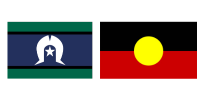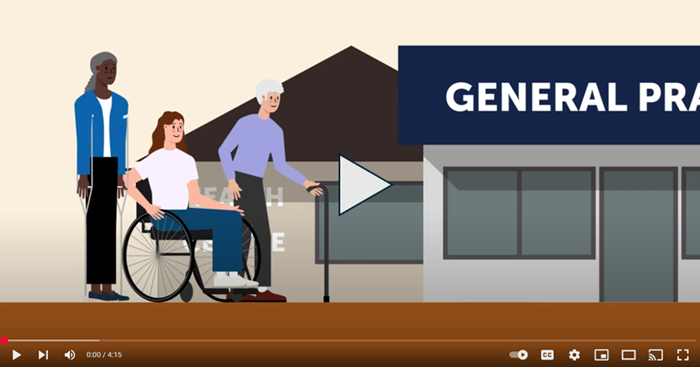Issue 221 – 29 May 2025

| Welcome to Practice Connect, a fortnightly update for practice managers, principals, nurses and administration staff on relevant issues, upcoming events and education. |

Upcoming changes to the MBS Chronic Disease Management Framework

On 23 May 2025, MBS Online published the Upcoming Changes to the Chronic Disease Management Framework confirming the new framework for chronic disease management from 1 July 2025.
The changes simplify, streamline, and modernise the arrangements for health care professionals and patients.
These changes primarily affect medical practitioners, however, allied health professionals providing MBS services should be aware of the changes to plan and referral requirements.
Transition arrangements will be in place for 2 years to ensure current patients do not lose access to services.
From 1 July 2025:
- Items for GP management plans (229, 721, 92024, 92055), team care arrangements (230, 723, 92025, 92056) and reviews (233, 732, 92028, 92059) will cease and be replaced with a new streamlined GP chronic condition management plan (see table below for item numbers)
- The updated framework will be known as chronic condition management.
- To support continuity of care, patients registered through MyMedicare will be required to access the GP chronic condition management plan and review items through the practice where they are registered. Other patients will be able to access the items through their usual GP.
- Where multidisciplinary care is required, patients will be able to access the same range of services currently available through GP management plans and team care arrangements.
- GPs and prescribed medical practitioners will refer patients with a GP chronic condition management plan to allied health services directly. The requirement to consult with at least two collaborating providers, as described under the current team care arrangements will be removed.
- Practice nurses, Aboriginal and Torres Strait Islander health practitioners and Aboriginal health workers will be able to assist the GP or prescribed medical practitioner to prepare or review a GP chronic condition management plan.
- To encourage reviews and ongoing care, the MBS fees for planning and review items will be equalised. The fee for the preparation or review of a plan will be $156.55 for GPs and $125.30 for prescribed medical practitioners. Patients will also need to have their GP chronic condition management plan prepared or reviewed in the previous 18 months to continue to access allied health services.
- Consistent with current arrangements, unless exceptional circumstances apply, a GP chronic condition management plan can be prepared once every 12 months (if necessary) and reviews can be conducted once every 3 months. It is not required that a new plan be prepared each year, existing plans can continue to be reviewed.
- Patients that had a GP management plan and/or team care arrangement in place prior to 1 July 2025 will be able to continue to access services consistent with those plans for two years. From 1 July 2027, a GP chronic condition management plan will be required for ongoing access to allied health services.
- These changes do not affect multidisciplinary care plan items (231, 232, 729, 731, 92026, 92027, 92057, 92058).
Table 1: Chronic Condition Management Items commencing 1 July 2025*
| Name of Item | GP item number | Prescribed medical practitioner item number |
| Prepare a GP chronic condition management plan – face to face | 965 | 392 |
| Prepare a GP chronic condition management plan – video | 92029 | 92060 |
| Review a GP chronic condition management plan – face to face | 967 | 393 |
| Review a GP chronic condition management plan – video | 92030 | 92061 |
For more information, MBS Online has released a selection of factsheets here.
For suggested quality improvement activities to get your practice ready for the upcoming changes see the Chronic Conditions Management (CCM) Activation Series on the Practice Assist MyMedicare page.
For further information and support on the upcoming changes to the MBS Chronic Disease Management Framework contact the Practice Assist Help Desk on 1800 2 ASSIST (1800 2 277 478) or 08 6278 7900 or via email practiceassist@wapha.org.au
Supporting a new women’s clinic with quality improvement activities
Southern Star Medical has opened a new women’s wellness clinic in Southern River and WA Primary Health Alliance (WAPHA) Quality Improvement (QI) Coach, Cassandra Cotte, is supporting the practice team with a range of QI activities for continuous improvement in patient care.
“Bloom Women’s Wellness Clinic is a state-of-the-art facility dedicated to providing comprehensive and compassionate care to women of all ages, throughout every stage of life. I am working closely with the clinic on various QI initiatives, while the team provides a wide variety of services from routine check-ups to specialised care, covering a broad spectrum of women’s health issues,” Ms Cotte said.
Southern Star Medical Practice Manager, Laura Johnson, explained that the clinic has a team of experienced health care professionals, which includes a women’s health nurse and female GPs who are focused on empowering women with the knowledge and resources they need to make informed decisions about their health.
“Since opening the clinic, we have received overwhelmingly positive feedback from our patients, with many praising its welcoming atmosphere, knowledgeable staff and high-quality care. We’re proud to offer this valuable service to the community and look forward to continuing to provide top-notch care to our patients,” Ms Johnson said.
For further information about developing QI activities to support continuous improvement in your practice, email WAPHA’s QI team via qi@wapha.org.au or call the Practice Assist help desk on 1800 2 ASSIST (1800 2 277 478 or 08 6278 7900) or email practiceassist@wapha.org.au
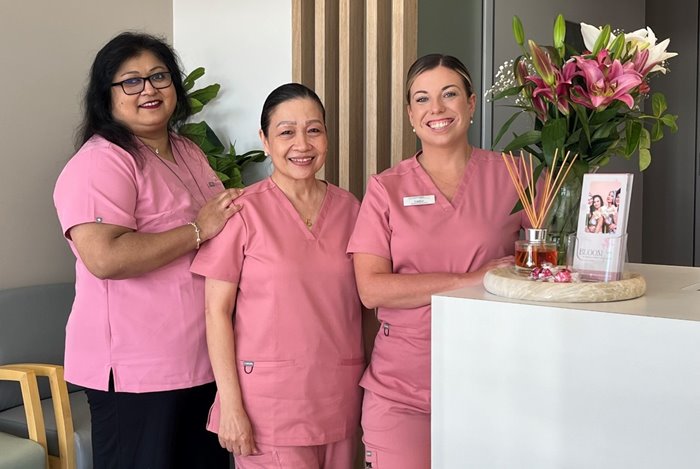
Dr Sehli Quaddus, Dr May Ann Wong and RN Caitlyn Rogers at Bloom Women’s Wellness Clinic.
Pursuit of health equity for under-served communities in WA
In WA, some groups are at greater risk of poorer health outcomes including Aboriginal people, people from multicultural communities, LGBTIQA+ people, people experiencing socioeconomic disadvantage and those with limited access to health care.
While not every person in every group has the same experience, some groups are more likely to experience inequities in health and wellbeing associated with social determinants of health. This includes things like lack of local health services where they live, stigma, discrimination and unequal access to resources.
Evidence shows that these people tend to:
- Seek treatment later in the course of an illness.
- Present to hospital EDs more frequently.
- Face challenges in accessing preventative health care.
- Have poor health literacy.
Mapping and understanding under-served communities and the barriers they face is crucial. It helps us to improve the efficiency and effectiveness of primary health care services, particularly for those at risk of poor health outcomes, and allows us to improve the coordination of care to ensure patients receive the right care in the right place at the right time. As a commissioner of primary health care services, a key focus for WA Primary Health Alliance is how to use finite resources in a way that will have the greatest impact and outcome for these under-served communities.
Chronic Wound Consumables Scheme
The Chronic Wound Consumables Scheme (CWCS) will help eligible patients manage their chronic wounds. It will cover the full cost of products they need to heal, such as bandages, dressings and adhesives.
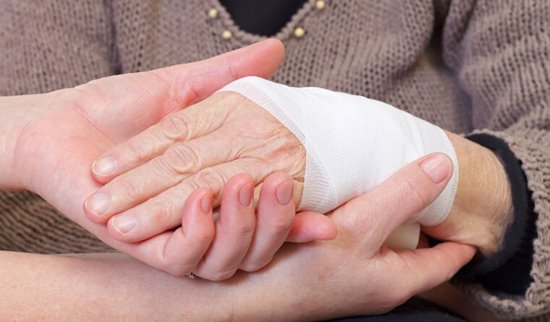
Eligible health professionals
Health professionals will be eligible if they are:
- Aboriginal and Torres Strait Islander health practitioners
- medical practitioners in a primary care setting, including general practitioners
- registered nurses and nurse practitioners
- podiatrists.
Eligible health professionals will need to complete specified training to use the online portal.
For further information and contact details, visit the Department of Health, Disability and Ageing Chronic Wound Consumables Scheme page.
Helping health providers better understand DVA’s arrangements
The Department of Veterans’ Affairs (DVA) acknowledges the important role health providers play in supporting the health and wellbeing of the veteran community, and in turn they aim to support providers in understanding DVA’s billing and advertising arrangements to remain compliant.
Tips for providers
DVA arrangements can be complex, so DVA have drafted some tips to help providers here.
Explore DVA’s new website before it officially launches – test (beta) site live now!
The Department of Veterans’ Affairs (DVA) are making changes to the DVA website to help veterans, families, advocates, and health providers find the information and support they need—faster and easier.
What’s new?
The following changes have been made based on feedback that they received from providers through co-design workshops and user testing:
- A dedicated tile for providers which is accessible from the home page.
- New navigation to help you find the information you need quickly.
- A refreshed, modern design for a more user-friendly experience.
Visit the test site here to try out the new navigation.

RSV Awareness Week
The Immunisation Foundation of Australia invites you to celebrate RSV Awareness Week
from 1-7 June 2025.
With RSV (respiratory syncytial virus) immunisations now available for pregnant women,
babies and older adults, now is the time to unite against RSV to raise awareness and protect
those at greatest risk.
RSV is a leading cause of hospitalisation in Australian babies and older adults.
WA AIR data show that only 22% of infants born between Oct 2024 and February 2025 have
received Beyfortus to date – this is a significant drop from the 36% of infants in the RSV
‘catch-up cohort’ who were protected at this time last year.
Every infant whose mother did not receive maternal RSV vaccination is recommended to have Beyfortus before the winter RSV season starts.
In WA 11,000 children were born between 1 Oct 2024 and 1 February 2025 (i.e. before maternal RSV vaccinations even started) and these infants will remain unprotected from serious RSV disease unless they receive Beyfortus.
This year’s themes for RSV Awareness Week are:
- Don’t Let Them Go Unprotected (for babies and young children) and
- Don’t Go Unprotected (for older adults)
The campaign aims to build understanding and acceptance of RSV immunisations to help protect those at greatest risk of serious illness.
Your support is needed to help spread the message.
Think about:
- Hosting an event
- Displaying a poster
- Sharing a social media post using the hashtag #RSVweek25
- Include an article in your practice newsletter
To support your efforts, access the Campaign Toolkit with guidance and a full suite of RSV Awareness Week resources.
For further information on the RSV program, click here.
For an RSV flowchart for eligibility guidelines, click here.
Webinar: RSV prevention begins before birth
Presented by Immunisation Coalition
3 June 2025 (4.30pm – 5.30pm AWST)
This webinar’s objective is to update and educate primary care healthcare professionals on the
availability and administration of a new NIP-listed maternal RSV vaccine to protect newborn
babies from RSV infection.
To register for this activity, simply:
- Download the CPD HCP app on your phone or tablet or visit the website.
- Click on Create an Account or login with your existing account if you have used this website or app previously.
- Click on the arrow next to the event and click on register.
Three recent cases of Mpox in WA
The WA Communicable Disease Control Directorate (CDCD) has advised of three notified Mpox cases (clade II) in WA in the week commencing Monday 19 May 2025.
Testing and diagnosis
Please continue to test all patients presenting with a clinically compatible illness, irrespective of travel history.
Refer to the Mpox Quick Guide for primary healthcare workers for testing guidance, including specimen collection and PPE requirements.
Provide the Mpox – Information for people awaiting a test result factsheet to all patients who have been tested for Mpox.
Vaccination for eligible people
Please continue to encourage and promote Mpox vaccination. Visit the Mpox immunisation page for a list of people recommended and eligible to receive the Mpox vaccine in WA.
Currently there is no change to the approach or management of Mpox in Western Australia. The CDCD will continue to provide relevant updates as required.
A new home for NCIRS’ COVID-19 resources, including updated FAQs
The National Centre for Immunisation Research and Surveillance (NCIRS) has published a new webpage that will act as a hub for their evolving range of COVID-19-related resources.
The page includes links to various useful materials – including their popular COVID-19 vaccines FAQs resource, which was updated recently and includes clear, accessible guidance on a range of areas relating to COVID-19 vaccination, in support of the Australian Immunisation Handbook COVID-19 chapter.
It was noted in the most recent Australian Respiratory Surveillance Report, COVID-19 has been the leading cause of acute respiratory infection mortality in the 2023–2025 period. The disease is more likely to cause death in older age groups.
NCIRS was closely involved in Australia’s emergency response to the COVID-19 pandemic.
Access the new webpage here.

Online course – Vaccination in the immunocompromised patient
Presented by Immunisation Coalition
Online course
Vaccination saves lives—but for immunocompromised patients, the risks, timing, and guidelines are more complex.
The Immunisation Coalition have created an online course, ‘Vaccination in the Immunocompromised Patient’, which equips you with the knowledge to make safe, evidence-based decisions in this high-risk population.
From timing strategies to vaccine efficacy and contraindications, this comprehensive, self-accredited 2 hour CME course will give you the confidence to safely vaccinate immunocompromised individuals.
This course is specific for nurses and covers 5 topics including guidelines and recommendations, case studies and quizzes.
Learn at your own pace and receive a certificate upon completion.
The current cost to complete the course is $199.00.
To register for this activity, simply:
- Go to the Immunisation Coalition registration page
- Register your account or click “login here” if you already have an account
- Click “take course”
Immunisation Coalition – Annual Immunisation Forum
Presented by Immunisation Coalition
Friday 13 June 2025 (7.00am – 3.00pm AWST) hybrid event
The 9th Annual Immunisation Forum (AIF) hybrid event will take a place at the Adelaide Convention Centre in Adelaide on 13 June 2025.
The meeting is ideal for GPs, practice nurses, specialists, pharmacists and other immunisation specialists.
The program covers the following topics: a look into aged care, new vaccines for the elderly, adjuvanted vaccines, vaccinations in primary care and pharmacy, managing vaccine hesitancy, targeting at-risk populations and addressing the vaccine gap of First Nations peoples.
This is a free CPD accredited (for online participation) meeting for a national audience.
Register for online attendance – via Zoom.
Pneumococcal: Need-to-knows – who’s at risk & what to do
Presented by United Clinical
18 June 2025 (5pm AWST) free online masterclass
Rates of invasive pneumococcal disease are at their highest in two decades.
It remains a leading cause of avoidable hospitalisation and poor outcomes in older Australians – particularly those with chronic conditions. Yet many high-risk adults remain under vaccinated.
Join United Clinical for the first in a two-part accredited masterclass series, designed to equip GPs and practice teams with practical strategies to identify and protect those most at risk. Pending CPD Home approval for 8 hours (including post-work), and open to all healthcare professionals.
Register now to join live or to receive a recording of the event.
MenB vaccination through general practice
Presented by Immunisation Coalition
24 June 2025 (4.30pm to 5.30pm AWST) online panel discussion
The objective of this panel discussion is to update primary healthcare professionals on the burden of meningococcal disease with a focus on Meningococcal B vaccination.
Learning outcomes include:
- Recap the epidemiology and burden of disease in Australia of the different disease-causing meningococcal strains.
- Summarise the NIP eligibility criteria for meningococcal disease, recommendations supporting vaccination outside of the NIP, and the current State and Territory funded programs.
- Examine and analyse current funded programs on MenB, how these were successfully organised and coordinated to show an increase in MenB vaccination rates.
- Review the learnings from MenB State and Territory funded programs and how other States could adopt a similar targeted approach.
- Explore the use of key messages when discussing meningococcal disease and MenB vaccination with parents and patients (specifically adolescent and young adults) to help boost confidence in addressing questions, objections and concerns.
To register for this activity, simply:
- Download the CPD HCP app on your phone or tablet or via the website here.
- Click on Create an Account or login with your existing account if you have used this website or app previously.
- Click on the arrow next to the event and click on register.
Adolescent and maternal vaccinations, plus a mid-winter illness report card
Presented by RACGP
3 July 2025 (7pm to 8pm AWST) webinar
Join infectious disease expert Prof. Paul Effler for a webinar concerning adolescent and maternal vaccinations, plus a WA mid-winter illness update. You’ll have the opportunity to ask questions during the Q&A. If you have a question prior, you can submit it upon registration.
Prof Paul Effler is the Senior Medical Advisor, Communicable Disease Control Directorate, Department of Health, Western Australia. Hosted by GP Dr Ramya Raman.
This webinar is delivered in partnership with the Department of Health Western Australia.

Encouraging bowel screening in patients aged over 45
Did you know that patients aged 45 to 49 are eligible to do the free National Bowel Cancer Screening Program test?
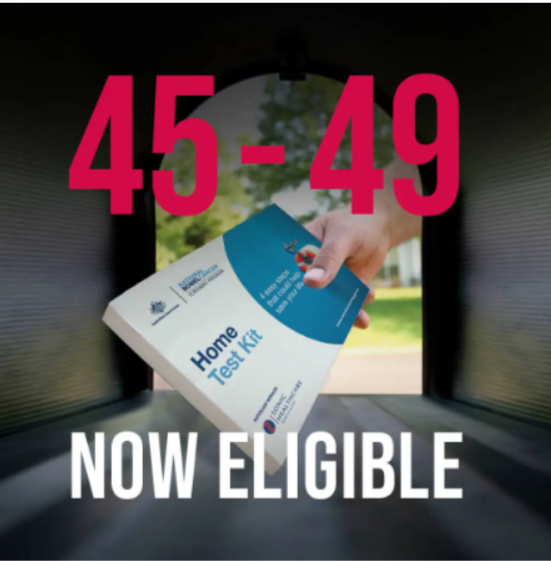
- The National Bowel Screening Program automatically mail the test to people aged 50 to 74 every 2 years. But people aged 45 to 49 need to request their first free kit—and you can quickly help them do it.From now until the end of June, eligible Australians aged 45 to 49 will receive an SMS. The message will invite them to order their first free kit or to speak with their doctor about screening. The National Bowel Screening Program will send SMS messages only to those people they have mobile numbers for and who haven’t yet requested a free kit.You can help all patients aged 45 to 74 to do the test by:
- ordering their first kit or replacing a lost or expired kit by completing a webform
- stocking and issuing National Bowel Cancer Screening Program kits.
National Lung Cancer Screening Program coming July 2025
The National Lung Cancer Screening Program (NLCSP) launches in July 2025, helping to save hundreds of lives each year by detecting lung cancer early.
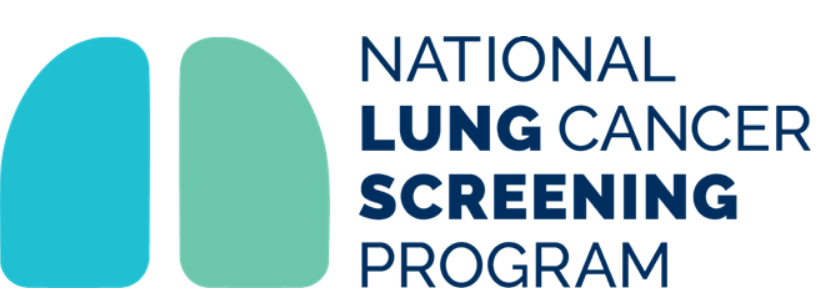
Your practice will play a critical role in supporting participation in the program.
Here are a few steps you can take to get your practice ready:
- Use the resources available on the Department of Health, Disability and Ageing website.
- Complete the accredited eLearning modules for the program available through the Lung Foundation Australia Lung Learning Hub.
- Listen to the webinar on how to prepare for and integrate the program in your practice. You can access the recording of the webinar by registering here.
- Register and integrate your clinical software with the National Cancer Screening Register.
- Review and update smoking histories in your clinical records to identify patients who could be eligible.
More information available here.

Commonwealth Department of Health, Disability and Ageing immunisation survey

The Commonwealth Department of Health, Disability and Ageing is currently reviewing immunisation information on the health.gov.au website.
They are seeking feedback from health professionals to make sure the information is relevant and useful.
Health professionals can complete the online survey for health professionals.
The surveys are open to everyone until 30 May. Please share the link with anyone who might be interested, including your networks.
Have your say on the new medical imaging accreditation scheme

The Australian Commission on Safety and Quality in Health Care has developed the Australian Safety and Quality Medical Imaging Accreditation (ASQMIA) Scheme. The ASQMIA Scheme will replace the Diagnostic Imaging Accreditation Scheme (DIAS).
The Commission welcomes feedback on the following areas:
- Clarification: Does any of the content of the ASQMIA Scheme need clarification?
- Appropriateness: Is the categorising of imaging practices by risk, appropriate?
- Safety and quality: In comparison to the DIAS desktop assessment will the ASQMIA Scheme assessment improve medical imaging safety and quality?
- Infrastructure: Does your organisation have the IT infrastructure (internet and portable device) to complete a virtual assessment?
- Concerns: Do you have any concerns or other feedback about the ASQMIA Scheme?
To contribute, visit the Commission’s webpage before Friday 18 July 2025 to have your say.

Acknowledging National Reconciliation Week – Bridging Now to Next

National Reconciliation Week (NRW), held from 27 May to 3 June each year, is a time for all Australians to reflect on our shared history and take meaningful steps toward a more inclusive and respectful future.
For general practices, acknowledging NRW is more than symbolic—it’s a vital opportunity to strengthen relationships with Aboriginal and Torres Strait Islander patients and work towards better health outcomes through cultural understanding and respect.
Get Involved This Reconciliation Week
General practices can take part in NRW by:
- Displaying Reconciliation Week posters or messages in waiting areas
- Acknowledging NRW in staff meetings and patient communications
- Hosting a morning tea or information session to learn about local Aboriginal history
- Exploring resources and event ideas from Reconciliation WA
Free Aboriginal cultural diversity training for all practice staff
Presented by WA Primary Health Alliance
Available until June 2025
To further support reconciliation, WA Primary Health Alliance is offering free online Aboriginal cultural diversity training for all general practice staff, available until June 2025. View the flyer and register here.

Webinar: Accreditation for Nurses in General Practice
Presented by WA Primary Health Alliance
18 June 2025 (12pm to 1pm)

Join us for an informative and engaging webinar designed specifically for nurses working in general practice.
This session will cover the essential aspects of accreditation, including the latest standards, best practices and practical tips to ensure your team feels confident in demonstrating quality improvement to maintain the RACGP standards.
Key topics:
- The role of quality improvement in accreditation.
- Understanding accreditation standards and requirements.
- Best practices for maintaining compliance.
- The role of practice nurses in achieving accreditation standards.
- Practical strategies to support accreditation readiness.
- Insights from industry experts on accreditation best practices.
- Q&A session with industry experts.
To find out more, view the flyer and register today.
Webinar Series: Dementia Demystified
Webinar 2 – Diagnosing Dementia: A Structured Approach
Thursday 19 June 2025 (6pm to 7pm)

Join us for the second webinar in the Dementia Demystified series by Dementia Training Australia’s expert medical education team.
This webinar will cover the following topics:
- Apply the Inclusion and Exclusion Criteria Frameworks in assessing patients for a possible diagnosis of Alzheimer’s dementia.
- Identify and address modifiable risk factors to help prevent, delay the onset and slow the progression of dementia.
The Dementia Demystified webinar series provides a practical and stepwise approach to improving knowledge, skills and confidence in dementia recognition, diagnosis and management within the general practice setting.
The webinars are designed for GPs, however general practice nurses and primary care health professionals are also welcome to attend.
Each webinar is accredited for 1 RACGP EA CPD hour.
To find out more, view the flyer and register webinar 2 today.
Webinar Series: Advancing Multidisciplinary Team Care in General Practice
Presented by WA Primary Health Alliance in partnership with AGPAL
3 June 2025 (1pm to 2pm) and 17 June (12pm to 1pm) Online

As general practice in Western Australia adapts to ongoing funding reform and increasing complexity in patient needs, this two-part interactive webinar series offers timely, targeted support for teams delivering multidisciplinary team (MDT)-based care.
Whether you’re a GP, nurse, allied health professional, practice manager or support staff, these CPD-accredited webinars will provide practical tools and strategies to enhance coordination, efficiency and equitable outcomes for all patients.
Each webinar is accredited for 1 RACGP EA CPD hour and includes an expert-led presentation, real-world case studies and a live Q&A segment to deepen understanding and facilitate application to your own practice.
Join us to strengthen your team’s capability and stay ahead of system reform.
To find out more, view the flyer and register for webinar 1 and webinar 2 today.
Aboriginal cultural diversity training – free online training for all practice staff
Presented by WA Primary Health Alliance
Available until June 2025

To help improve health outcomes for Aboriginal people, WA Primary Health Alliance (WAPHA) is offering free online Aboriginal cultural diversity training for all general practice staff.
The free online training is the SBS Inclusion Program (First Nations) that includes short learning modules, which take approximately an hour to complete in total, with the following learning outcomes:
- Improving knowledge about the history of Aboriginal culture and experiences.
- Understanding how to identify myths versus facts. Comprehending some of the stereotypes and assumptions sometimes made about Aboriginal people.
- Recognising the importance of spirituality in Aboriginal culture.
- Recognising the importance of family and kinship in Aboriginal culture.
- Grasping the impact of colonisation on Aboriginal people.
- Comprehending the trauma felt by the Stolen Generations and the intergenerational trauma still being felt today.
- Implementing tools to actively participate in the reconciliation process as both an individual and a business.
- Explaining what the Uluru Statement from the Heart is and how it came about.
- Describing the events that led to the referendum in 2023, which proposed Aboriginal people be recognised in an enshrined Voice to Parliament.
To find out more view the flyer here and register today!
Register now for a Clinician Assist WA live demonstration
Presented by Clinician Assist WA
Multiple Times & Dates Online

Clinician Assist WA is a secure website providing GPs and other health professionals with guidance for assessing, managing and referring patients across Western Australia. It has replaced HealthPathways WA, offering the same trusted local guidance, features and functionality and remains available at no cost.
The Clinician Assist WA team will run online demonstrations facilitated by a GP Clinical Editor throughout 2025 to support users. These sessions will demonstrate how to maximise integration of Clinician Assist WA into your clinical practice. Learn key functionalities of the website and how to access condition specific tools and resources, Referral Access Criteria (RAC) (where available), GPbook Specialist Directory and visiting specialist rosters.
Sessions have been approved for 1 CPD Educational Hour with RACGP and will be held online on the following dates:
- Thursday 12 June 2025 – 12:30pm to 1:15pm
- Wednesday 17 September 2025 – 12:30pm to 1:15pm
- Tuesday 18 November 2025 – 12:30pm to 1:15pm
Demonstrations are open to general practitioners, general practice staff and other health professionals registered to practice in WA.
Other Webinars, Events & Workshops
| BreastScreen WA visit to Quairading Presented by BreastScreen WA 29 May to 30 May |
| C the Whole Story Forum III: Advancing Integration of Hepatitis C Care Presented by ASHM 29 May |
| Advanced HIV Nursing Course Presented by ASHM 30 May |
| WA Hepatitis B s100 Prescriber Course Presented by ASHM 3 June (Part 1) 10 June (Part 2) 17 June (Part 3) |
| BreastScreen WA visit to Cunderdin Presented by BreastScreen WA 3 June to 9 June |
| BreastScreen WA visit to Kellerberrin Presented by BreastScreen WA 10 June to 17 June |
| Wesley LifeForce Suicide Prevention Training Primary Care Support Staff Workshop (Subiaco) Presented by Wesley LifeForce 10 June |
| Unintended Pregnancy Counselling Training (webinar) Presented by SHQ 10 June to 11 June |
| MPA/MIA Melanoma Community Information Series (Tuesday evenings from 10-24 June) Presented by Melanoma Institute Australia 10 June to 24 June |
| Al in Mental Health: Navigating the Future of Clinical Practice Presented by Black Dog Institute 12 June |
| 2025 NU-CUES Training Dates Presented by CliniKids 17 June and 24 June |
| Talking About Suicide in Practice (3 hour interactive webinar) Presented by Black Dog Institute 17 June |
| BreastScreen WA visit to Geraldton Presented by BreastScreen WA 17 June to 18 September |
| BreastScreen WA visit to Merredin Presented by BreastScreen WA 18 June to 10 July |
| Online education – Sepsis in Primary Care (webinar) Presented by Australian Commission on Safety and Quality in Health Care 18 June |
| Wesley LifeForce Suicide Prevention Training Primary Care Support Staff Workshop (Success) Presented by Wesley LifeForce 25 June |
| FPAA Certificate in Reproductive and Sexual Health for Doctors Presented by SHQ 30 June to 4 July |
| Course in Wound Closure Presented by Benchmarque Group 11 July |
| WA HIV Prescriber Update – ARV Update Presented by ASHM 15 July |
| WA HIV Prescriber Update – HIV and the Heart & Mind Presented by ASHM 29 July |
| ACNP National Conference Presented by Australian College of Nurse Practitioners (ACNP) 29 October to 31 October |
| Asia Pacific Autism Conference (APAC) Presented by Autism Association of Western Australia 13 November to 15 November |
Acknowledgement
WA Primary Health Alliance acknowledges and pays respect to the Traditional Owners and Elders of this country and recognises the significant importance of their cultural heritage, values and beliefs and how these contribute to the positive health and wellbeing of the whole community.
